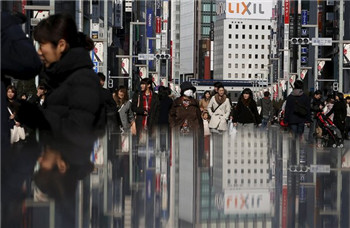(单词翻译:单击)

TOKYO — The Japanese economy deteriorated more severely than expected in the third quarter, according to government data released on Monday, extending a downturn into a second consecutive three-month period and putting the country in technical recession.
东京——日本政府周一公布的数据显示,日本经济在第三季度严重恶化,程度超过预期,致使日本经济连续两个季度衰退,陷入技术性衰退。
In a preliminary estimate, the Cabinet Office said output declined by an annualized 0.8 percent. Economists surveyed by news agencies had expected a contraction of 0.3 percent, on average.
内阁府表示,根据初步估算,日本经济产出按年率计算萎缩了0.8%。新闻机构调查的经济学家曾预计会出现平均0.3%的收缩。
Worsening business confidence appeared to have contributed to the fall. Companies reduced investment in the quarter and drew down on inventories rather than increasing production, the data showed.
商业信心的减弱似乎在一定程度上导致经济出现衰退。数据显示,各个公司在本季度缩减投资,减少库存,而不是增加产量。
With its work force shrinking, Japan grows more slowly than other countries at the best of times. Small setbacks can easily send it into reverse. The latest recession was its fifth since the global financial crisis of 2008, though by some measures, including unemployment, the picture looks much less dire.
随着劳动力的减少,日本经济即便在最好的情况下,增长速度也低于其他国家。小挫折很容易导致经济出现倒退。这是自2008年金融危机以来日本经济的第五次衰退,但从失业率等标准来看,前景看起来没那么可怕。
The recession could nonetheless intensify skepticism about Japanese economic policy. Prime Minister Shinzo Abe gained office three years ago on a pledge to reset Japan’s growth trajectory. So far, his “Abenomics” program, centered on aggressive stimulus by the central bank, has struggled to reach its ambitious goals for lifting incomes, spending and investment.
尽管如此,这种衰退景象可能会加剧人们对日本经济政策的怀疑。日本首相安倍晋三(Shinzo Abe)三年前凭借重置日本经济增长轨迹的承诺赢得选举。迄今为止,他采取的以央行积极刺激举措为中心的“安倍经济学”政策,难以实现其雄心勃勃的目标——提高收入、开支和投资。


